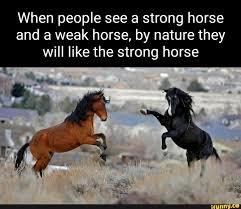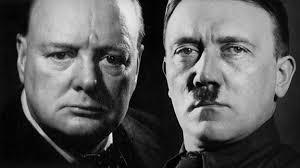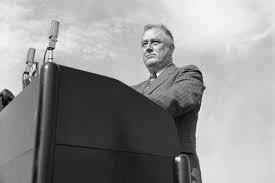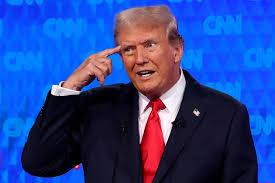
“Strength” was a key psychological factor in the 2024 election. Osama Bin Laden famously said, “if people see a strong horse and a weak horse, by nature they will like the strong horse.” Evolution programmed us to venerate strength, as needed to overcome our forebears’ tough challenges. Thus the attraction of machismo maleness.
One kind of strength we still need is moral courage. Its widespread lack, in politics, explains so much ineffectual fecklessness. That contributed to the 2024 allure of “strength.” Trump was onto something with his “I alone can fix it.”

All fine if we’re talking strength to achieve what’s good and right. Churchill was strong. But so was Hitler.
In that regard, Trump’s strength appeal has been indiscriminate. Voters falling for the image of it, disregarding what he actually is or does. His second administration bursts with strength — and not in a good way.
Jackson Lears’s 2023 book Animal Spirits chronicles that titular idea in American cultural history, wherein it long loomed large. Then Lears comes to the Great Depression, vividly describing how the bottom fell out of our elan vital — “a collective withdrawal of energy from the atmosphere of everyday economic life . . . a collective emotional breakdown.” The can-do spirit that had underpinned our societal robustness suddenly vanished.

Reading this, I was struck by two comparisons. One with 1930s Germany that Lears discusses. The other was today’s America.
Germany too was in a funk. Not just from the global Depression, but previously a bout of hyperinflation. (Think eggs are high? Try a billion per carton.) And the WWI defeat was seen as a national humiliation.
Both Germans and Americans, then, were desperate for revivifying leadership. Germany got Hitler. We got FDR.
Lears’s writing inspires goosebumps. On March 4, 1933, “in Washington, the skies were gray, and it was damp and chill when Roosevelt stood at the podium . . . the nation waited.”

Then heard, “the only thing we have to fear is fear itself.” Writes Lears, “the man who had overcome his own paralysis to become president was now ministering to the nation’s paralysis. Rejecting the fascist rhetoric of vengeful victimhood (my emphasis), Roosevelt rallied Americans to embrace a moral equivalent of war — a collective campaign against the Depression in the spirit of William James, rather than Benito Mussolini.” His inaugural speech “replenished the springs of emotional vitality.”
Lears ends here with words you’ll guess: strong leader. The emphasis being on leader. With a true leader, the strength comes naturally. And what do we mean by “leadership?” Not manipulating people — nor giving voice to their fears and prejudices. Rather, giving them a guiding light to rise above that.
Now to today’s America. Again, there was hunger for strong leadership. Many people have had a very negative take on our economy. Partly self-reinforced by a drumbeat of dark verbiage — including Trump portraying a dystopian hellhole. Though now saying he’s fixed it all within weeks (actually he’s wrecking it). Meantime, The Economist had recently analyzed our economy as the envy of the world.

Anyhow, we’re in no Great Depression. In fact, the comparison between then and now is stark. A century ago, most Americans lived in what we’d consider extreme deprivation, a far cry from what’s really mass affluence today, with even the poorest living better than the past norm. To complain about egg prices seems spoiled whining.
Note that the Great Depression’s economic desperation did spark some radical politics — like in Europe. But unlike there, here such extremism never had much of a toehold. In spite of everything, Americans kept their heads. And so we did get an FDR, not a Hitler.
And yet — in 2024, with the economy vastly less dire — what we got is, well, no FDR. Roosevelt’s administration was somewhat radical. But Trump’s is far more so, truly history’s most lurching reordering of America’s public sphere, not only domestically, in our governance, but our relations with the world too.
Electing an FDR in 1932 was in contrast a very sensible response to circumstances. He summoned us to our best selves; Trump plays to our worst. FDR was a virtuous man actually dedicated to the public good. Trump couldn’t give a plying puck for the public good. Instead it’s all about him.
And it’s not mainly about money or even power (greedy though he is for those). What he truly craves is simply to look good and be slathered with praise. He doesn’t care about peace in Ukraine; what he wants is getting credit for it. Even a Nobel prize (hating that Obama got one; Trump never will).

It’s his bottomless insecurity, knowing deep down what a piece of crap he truly is. The flattery helps bury that, and he’s such a fool he seems not to realize how fake it all is. Clueless how his insatiable craving to look good results in the opposite.
This is not leadership. We did get a “strongman,” of sorts — but certainly not a strong leader.
